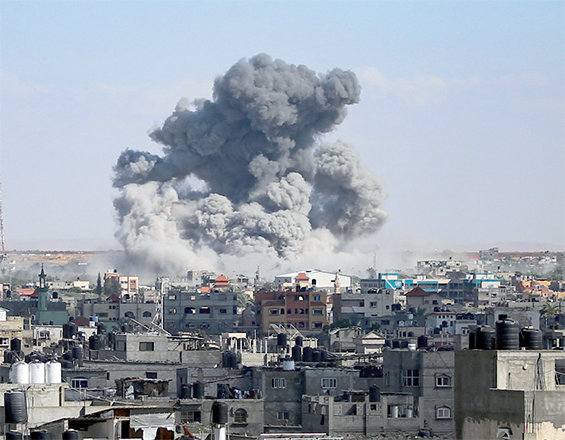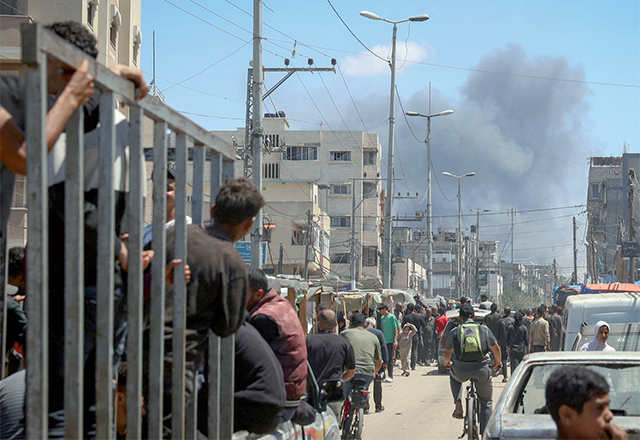You are here
Israel hits Rafah despite US warning on arms transfers
By AFP - May 10,2024 - Last updated at May 10,2024

Displaced Palestinians clear the rubble from a damaged building as they set up shelter after returning to Khan Yunis in the southern Gaza Strip on Thursday (AFP photo)
RAFAH, Palestinian Territories — Smoke rose from strikes on Gaza's crowded southern city of Rafah on Thursday after US President Joe Biden vowed to stop supplying artillery shells and other weapons to Israel if a full-scale assault goes ahead.
It was the starkest warning yet from the United States, Israel's main military provider, over the civilian impact of its war against Hamas.
An AFP correspondent and witnesses on Thursday reported Israeli strikes on several parts of Rafah, where the United Nations said 1.4 million people were sheltering.
"The tanks and jets are striking," Tarek Bahlul said on a deserted Rafah street. "Every minute you hear a rocket and you don't know where it will land."
Israel has already defied international objections by sending in tanks and conducting what it called "targeted raids" in eastern Rafah, the city it says is home to Hamas's last remaining battalions.
In an interview with CNN on Wednesday, Biden warned he would stop some US weapons supplies to Israel if it carried out its long-threatened Rafah assault.
Israel on Thursday called Biden's comments "very disappointing".
Biden told CNN: "If they go into Rafah, I'm not supplying the weapons that have been used... to deal with the cities."
"We're not gonna supply the weapons and the artillery shells that have been used."
The fresh warning came after his administration paused delivery last week of 1,800 2,000-pound (907-kilo) bombs and 1,700 500-pound bombs as Israel appeared ready to attack Rafah.
"Civilians have been killed in Gaza as a consequence of those bombs," Biden said. "It's just wrong."
Ties between the allies have become increasingly strained as Biden and other top Washington officials criticise Israel over its conduct of the war.
Pro-Palestinian protests have flared at universities across the United States with an intensity not seen for decades.
The Gaza war began with Hamas’s unprecedented October 7 attack on Israel, which resulted in the deaths of more than 1,170 people, mostly civilians, according to an AFP tally of Israeli official figures.
During their October attack militants seized some 250 hostages, of whom Israel estimates 128 remain in Gaza, including 36 who officials say are dead.
Israel’s retaliatory offensive has killed at least 34,904 people in Gaza, mostly women and children, according to the Hamas-run territory’s health ministry.
‘Very disappointing’
The United Nations agency for Palestinian refugees, UNRWA, said 80,000 people have fled Rafah since Monday, but “nowhere is safe”.
On Tuesday, Israel seized Rafah’s border crossing into Egypt, which had been the main entry point for aid.
The White House condemned the aid disruption, and the defence secretary later confirmed Washington had paused the bomb shipment.
In Israel’s first reaction to Biden’s threat, its UN ambassador Gilad Erdan called it a “very disappointing statement”.
“If Israel is restricted from entering an area as important and central as Rafah where there are thousands of terrorists, hostages and leaders of Hamas, how exactly are we supposed to achieve our goals?” he said on public radio.
Israel’s military said on Wednesday it was reopening another aid crossing into Gaza, Kerem Shalom, as well as the Erez crossing into north Gaza.
But it was unclear if aid was entering the territory where, according to the World Food Programme’s chief, famine has already begun.
US aid ship leaves for Gaza
UNRWA said the Kerem Abu Salem crossing — which Israel shut after a rocket attack killed four soldiers on Sunday — remained closed.
Late Wednesday, the army said a soldier was lightly wounded when rockets again targeted Kerem Abu Salem.
The Hamas authorities’ “emergency committee” in Rafah said on Thursday Israel’s “control of the Rafah crossing and its closure, along with the halt of aid and fuel supplies, threatens to exacerbate the humanitarian, environmental and health catastrophe”.
It dismissed as “nothing but lies” Israel’s description of its Rafah operation as “limited”.
A US container ship loaded with aid for Gaza left Cyprus Thursday in a new test of a maritime corridor to get relief into the besieged Palestinian territory, the Cyprus government said.
US military engineers have been assembling a temporary pier for installation on the Gaza coast to unload maritime aid deliveries but the work has been delayed by heavy seas.
“The platform is expected to be ready by the time the ship arrives in order for the aid to be unloaded and distributed to Palestinians in need,” Cyprus government spokesperson Yiannis Antoniou said.
US Secretary of State Antony Blinken has said the pier will “significantly increase” the volume of aid reaching Gaza but said it was not a “substitute” for greater land access via Israel.
Israeli and Hamas negotiating teams left Cairo Thursday after what the Egyptian hosts described as a “two-day round” of indirect negotiations on the terms of a Gaza truce, Egypt’s state-linked Al Qahera News reported.
Efforts by Egyptian, Qatari and US mediators “are ongoing to bring the two sides’ points of view closer”, the outlet said, citing a high-level Egyptian source.
The talks had begun with some optimism after Hamas announced it had accepted a draft truce plan put to it by Egyptian and Qatari mediators but Israel said the draft was “far” from what it had agreed and there were no further reports of any breakthroughs.
At a makeshift refugee camp in Rafah, Mazen Al Shami said she was fed up.
“We have no money and we don’t have the means to move from one place to another again and again. We have no means at all,” Shami said.
Related Articles
RAFAH, Palestinian Territories — Israel's military on Monday called for the evacuation of Palestinians from eastern Rafah ahead of a ground
RAFAH, Palestinian Territories — Heavy clashes and bombardment rocked the southern Gaza city of Rafah on Saturday, as the United Nations sai
RAFAH, Palestinian Territories — Israel sent tanks into Rafah in southern Gaza, seizing control of the border crossing with Egypt on Tuesday














